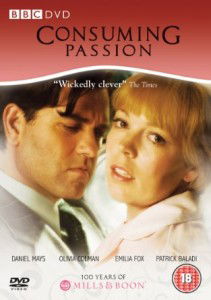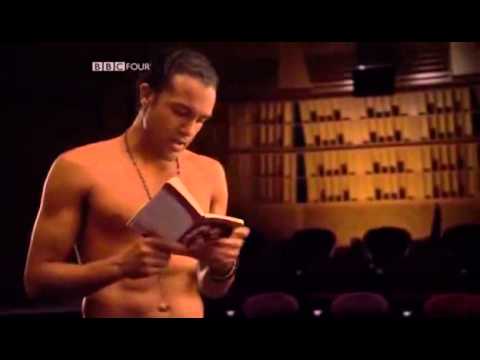SB Sarah: This rant/review/analysis comes from Vedrana, who found a 2008 BBC movie about Mills & Boon, and watched it online. It would be an understatement to say she found it frustrating.
Dear Smart Bitches,
I’m a listener from Australia, and I know how the Bitchery likes to pick apart representations of the romance genre, its authors and its readers in the media, so I was wondering whether anyone else had seen Consuming Passions: 100 Years of Mills and Boon. I came across an (ahem) not-entirely-legit copy on Youtube, and based on some further Googling I found out that it was shown on the BBC in 2008, so I’m guessing at least some of you would have seen it when it was on TV?
 To give a quick summary for anyone who is unfamiliar, there are three plots threaded together, each with a female character whose life is somehow connected to Mills and Boon. The first is Mary, the wife of Mr Boon, the unromantically business-minded publisher trying to figure out how to carve a niche in the book business. The second is Janet, a frumpy secretary who reads Mills and Boon to escape the drudgery of her life in 1970s Britain and develops an obsession for her mother’s douchebag surgeon. The final thread follows Kirstie, a 30-something-year-old lecturer who is giving a class on modern romance (but only seems to set M&B texts…?) who begins a steamy affair with one of her students, Jake.
To give a quick summary for anyone who is unfamiliar, there are three plots threaded together, each with a female character whose life is somehow connected to Mills and Boon. The first is Mary, the wife of Mr Boon, the unromantically business-minded publisher trying to figure out how to carve a niche in the book business. The second is Janet, a frumpy secretary who reads Mills and Boon to escape the drudgery of her life in 1970s Britain and develops an obsession for her mother’s douchebag surgeon. The final thread follows Kirstie, a 30-something-year-old lecturer who is giving a class on modern romance (but only seems to set M&B texts…?) who begins a steamy affair with one of her students, Jake.
I had a bunch of thoughts about this drama. Although this is about 100 years of romance from M&B, it basically trades in the same stereotypes and clichés about what romance is, who the readers are, and who the authors are, mostly based on cliches from Old Skool books which are mostly irrelevant to M&B circa 2008.
Firstly, the use of M&B as shorthand for romance is not unlike Kelly Faircloth’s observation that ‘Harlequin’ is a word used interchangeably with ‘romance’. Similarly, while the M&B brand is known almost universally as a romance publisher, little or no effort is made to explain how or why M&B’s books are different or unique in romance publishing or why they’ve enjoyed giant status within the industry over 100 years. For example, why does Kirsty decides to use M&B category romances by Raquel Pretty to teach her romance fiction class? There’s no real sense of where the M&B brand is today or what kinds of romance they now publish, and this seems like a missed opportunity to offer an original insight into the genre or the business it exists within. Or, heck, even the actual community of readers and writers who actual enjoy reading or writing romance.
There’s also little interest in what contemporary M&B offers for a diverse readership who want to read about different kinds of characters or tropes. There’s a nice little scene where Kirsty outlines the history of romance heroes, showing how each archetype bears some relation to its historical context. But she pretty much stops at the 1970s, the golden age of the rapey Old Skool alphole. So…we’re to assume that there are no other kinds of romance hero after 1970?
Also, the hero is the only character we’re meant to care about? What about the heroines? How have they changed over 100 years? Even this small scene feeds into the assumption that women reading romance only do so placing themselves in the position of the heroine, which doesn’t really reflect my experience of reading romance, and I suspect doesn’t resonate for other readers either. There is absolutely no effort by the script writer to discuss how varied romance is, given the wide tastes of its readership.
This is particularly frustrating in Kirstie’s storyline. The final confrontation with Jake ends with him ranting about the reason women want to read about rapey alphole heroes (read: all romance heroes ever), claiming that women want to experience desire without feeling guilt or any moral consequences. Apart from failing, as I have said before, to talk about different kinds of plots, characters and relationships within the romance genre, this scene rankled with me because *of course* it’s a man lecturing a woman about why women read particular books. *Of course* the man assumes that the male character is what matters for women who read romance. Of course he assume that women can’t distinguish between romance and reality.

Maybe what I really wanted was for there to be someone in this drama who reads contemporary romance and whose opinions of the genre are taken seriously. Kirstie has read these books, but she surveys them with the steely analysis of an academic. Jake questions her “interesting reading” when she drops an M&B on the way to a lecture and she replies frostily with, “I don’t read them. I teach them.” (Unfortunately we don’t have the satisfaction of anyone saying, “Fuck you, I don’t care what you think of my reading”).
Conversely, Janet is a figure of fun. She’s a voracious reader of M&B, but she appears to have no grip on reality and finds herself repeatedly humiliated. Mary Boon isn’t the one who reads the romances her husband publishes. He asks the house maid to read the manuscripts and she cheerfully says, “One was good. The rest I threw into the fire.” Since she was an incidental character, we have no idea as to what she thought was good or bad about these books. Presumably we’re supposed to assume it’s much of a muchness. There’s also a class dynamic at work here: Kirsty and Mary are upper middle class, whereas Janet is somewhere on the lower rungs of white collar work, and the maid is definitely working class. Basically, the drama is implying that well-educated women who have the time or the opportunity to think often and critically about what they read don’t read romance.
In all, I found this drama incredibly frustrating. This was an opportunity to say something new and interesting about M&B today, and instead it flopped back into lazy clichés about romance which betrayed a complete lack of genuine curiosity or interest about the subject.
/Rant over.
To return to my original question, did anyone else see this? Did anyone find anything redeemable about it?
Vedrana


Wait, Emilia Fox and Olivia Colman are in this thing? They’re two of the best actresses working in BBC TV at the moment – see Silent Witness and Broadchurch. I’m almost tempted to track it down for that fact, even though it does sound awful.
I saw this show back in the day and completely agree with your rant. Such an interesting case of wilful misunderstanding and unrepentant classism
If you want to lighten your mood go to
http://www.cbc.ca/radio/thedebaters
and choose the debate from last Saturday on romance novels.
Laugh out load funny! I will never think of the stable boy character the same way again.
I never met a professor who taught a subject they weren’t interested in.
Yup. Tried and failed. You don’t get to barge into a woman (who is also your tutor)’s personal space, randomly half naked and berate her for woman’s fantasies while trying to take the moral high ground. Ugh.
I’ve often wondered if the horror genre were written for women by women what kind of misrepresentation horror writers would have had to deal with. If it was Ms King instead of Mr King writing all those books made onto movies would she have the same respect from the press and fellow authors?
That sounds dreadful and misogynistic. Which is dismally what I would expect from a depiction of romance novel publishing. Since clearly what scares the patriarchy is women, particularly ones who read books, have agency and thoughts.
I remember catching a bit of this on TV back in 2008 and thinking it was a pretty poor offering, especially the lecturer storyline ending. The bbc do lots of great stuff, (the 90s Pride and Prejudice is bbc) but they do occasionally naff it up.
I guess it reflects the stigma and embarrassment around mills and boon (which is totally synonymous with romance in the uk, Avon, pocket etc really hardly have any presence compared to m&b in then he uk).
Having said that, this was 8 years ago now. At the time, pointing out that mills and boon existed and was a commercial business venture and that women did read these books was moderately revolutionary for the uber conservative bbc. If it comes across as embarrassed and awkward, it’s because it was. Very.